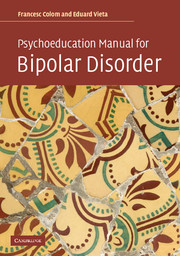Book contents
- Frontmatter
- Contents
- Foreword
- Preface
- Part 1 Clinical, diagnostic, and therapeutic aspects of bipolar disorders
- Part 2 Concept and methodology of psychoeducation
- Part 3 Psychoeducation program: sessions and contents
- Unit 1 Awareness of the disorder
- Session 1 Presentation and rules of the group
- Session 2 What is bipolar disorder?
- Session 3 Etiological and triggering factors
- Session 4 Symptoms I:Mania and hypomania
- Session 5 Symptoms II: Depression and mixed episodes
- Session 6 Evolution and prognosis
- Unit 2 Drug adherence
- Session 7 Treatment I: Mood stabilizers
- Session 8 Treatment II: Antimanic drugs
- Session 9 Treatment III: Antidepressants
- Session 10 Plasma levels of mood stabilizers
- Session 11 Pregnancy and genetic counseling
- Session 12 Psycho-pharmacology vs. alternative therapies
- Session 13 Risks associated with treatment withdrawal
- Unit 3 Avoiding substance abuse
- Session 14 Psychoactive substances: risks in bipolar disorders
- Unit 4 Early detection of new episodes
- Session 15 Early detection of mania and hypomanic episodes
- Session 16 Early detection of depressive and mixed episodes
- Session 17 What to do when a new phase is detected?
- Unit 5 Regular habits and stress management
- Session 18 Regularity of habits
- Session 19 Stress-control techniques
- Session 20 Problem-solving strategies
- Session 21 Closure
- Final note: Is psychoeducation efficacious?
- Bibliography
- Index
Session 11 - Pregnancy and genetic counseling
from Part 3 - Psychoeducation program: sessions and contents
Published online by Cambridge University Press: 06 January 2010
- Frontmatter
- Contents
- Foreword
- Preface
- Part 1 Clinical, diagnostic, and therapeutic aspects of bipolar disorders
- Part 2 Concept and methodology of psychoeducation
- Part 3 Psychoeducation program: sessions and contents
- Unit 1 Awareness of the disorder
- Session 1 Presentation and rules of the group
- Session 2 What is bipolar disorder?
- Session 3 Etiological and triggering factors
- Session 4 Symptoms I:Mania and hypomania
- Session 5 Symptoms II: Depression and mixed episodes
- Session 6 Evolution and prognosis
- Unit 2 Drug adherence
- Session 7 Treatment I: Mood stabilizers
- Session 8 Treatment II: Antimanic drugs
- Session 9 Treatment III: Antidepressants
- Session 10 Plasma levels of mood stabilizers
- Session 11 Pregnancy and genetic counseling
- Session 12 Psycho-pharmacology vs. alternative therapies
- Session 13 Risks associated with treatment withdrawal
- Unit 3 Avoiding substance abuse
- Session 14 Psychoactive substances: risks in bipolar disorders
- Unit 4 Early detection of new episodes
- Session 15 Early detection of mania and hypomanic episodes
- Session 16 Early detection of depressive and mixed episodes
- Session 17 What to do when a new phase is detected?
- Unit 5 Regular habits and stress management
- Session 18 Regularity of habits
- Session 19 Stress-control techniques
- Session 20 Problem-solving strategies
- Session 21 Closure
- Final note: Is psychoeducation efficacious?
- Bibliography
- Index
Summary
Goal
This session is especially addressed to our female patients, since its objective is to tackle the problematic relationship between psychotropic drugs and pregnancy. Given that this knowledge area has evolved significantly in recent years, we had to update the contents of the session several times; in the first groups, 10 years ago, we gave our patients instructions about how to plan a pregnancy based on the treatment with lithium salts. With the data we had available at that time, we considered that lithium always had to be stopped before conception, so that the pregnancies had to be perfectly well programmed in moments of stability. Subsequently, this message has become milder because the studies on the teratogenic risk of various psychotropic drugs – including lithium – do not offer such dramatic data, and the session is now focused on offering the patients sufficient information so that at a given time they may make the most suitable decision. The fundamental message of the session is that in all events, the patient must always consult her psychiatrist before deciding to become pregnant, in order to be able to have rigorous control along with her gynecologist. In the first years of the psychoeducation program, certain male patients requested permission to be absent from the session because they considered that it was not useful to them. The truth is that during the session there is a lot of discussion about the heritability of the bipolar disorder and the capacity of a person who suffers from the disorder to act as a father or mother, so we consider that the topic is of interest for all our patients.
- Type
- Chapter
- Information
- Psychoeducation Manual for Bipolar Disorder , pp. 130 - 134Publisher: Cambridge University PressPrint publication year: 2006

